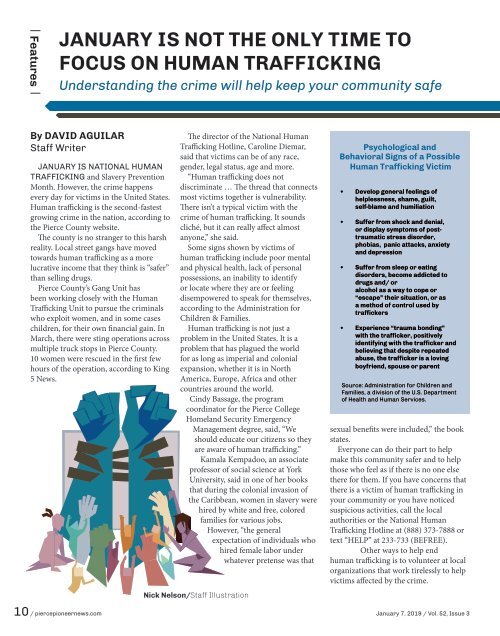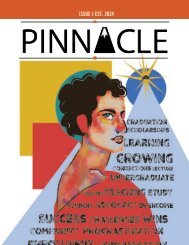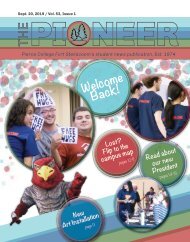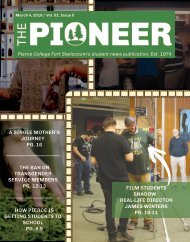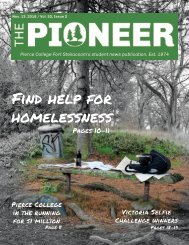The Pioneer, Vol. 52, Issue 3
The January 7, 2019 issue of The Pioneer — Pierce College Fort Steilacoom's student news publication in Lakewood, Washington.
The January 7, 2019 issue of The Pioneer — Pierce College Fort Steilacoom's student news publication in Lakewood, Washington.
Create successful ePaper yourself
Turn your PDF publications into a flip-book with our unique Google optimized e-Paper software.
Features<br />
JANUARY IS NOT THE ONLY TIME TO<br />
FOCUS ON HUMAN TRAFFICKING<br />
Understanding the crime will help keep your community safe<br />
By DAVID AGUILAR<br />
Staff Writer<br />
JANUARY IS NATIONAL HUMAN<br />
TRAFFICKING and Slavery Prevention<br />
Month. However, the crime happens<br />
every day for victims in the United States.<br />
Human trafficking is the second-fastest<br />
growing crime in the nation, according to<br />
the Pierce County website.<br />
<strong>The</strong> county is no stranger to this harsh<br />
reality. Local street gangs have moved<br />
towards human trafficking as a more<br />
lucrative income that they think is “safer”<br />
than selling drugs.<br />
Pierce County’s Gang Unit has<br />
been working closely with the Human<br />
Trafficking Unit to pursue the criminals<br />
who exploit women, and in some cases<br />
children, for their own financial gain. In<br />
March, there were sting operations across<br />
multiple truck stops in Pierce County.<br />
10 women were rescued in the first few<br />
hours of the operation, according to King<br />
5 News.<br />
10 / piercepioneernews.com<br />
<strong>The</strong> director of the National Human<br />
Trafficking Hotline, Caroline Diemar,<br />
said that victims can be of any race,<br />
gender, legal status, age and more.<br />
“Human trafficking does not<br />
discriminate … <strong>The</strong> thread that connects<br />
most victims together is vulnerability.<br />
<strong>The</strong>re isn’t a typical victim with the<br />
crime of human trafficking. It sounds<br />
cliché, but it can really affect almost<br />
anyone,” she said.<br />
Some signs shown by victims of<br />
human trafficking include poor mental<br />
and physical health, lack of personal<br />
possessions, an inability to identify<br />
or locate where they are or feeling<br />
disempowered to speak for themselves,<br />
according to the Administration for<br />
Children & Families.<br />
Human trafficking is not just a<br />
problem in the United States. It is a<br />
problem that has plagued the world<br />
for as long as imperial and colonial<br />
expansion, whether it is in North<br />
America, Europe, Africa and other<br />
countries around the world.<br />
Cindy Bassage, the program<br />
coordinator for the Pierce College<br />
Homeland Security Emergency<br />
Management degree, said, “We<br />
should educate our citizens so they<br />
are aware of human trafficking.”<br />
Kamala Kempadoo, an associate<br />
professor of social science at York<br />
University, said in one of her books<br />
that during the colonial invasion of<br />
the Caribbean, women in slavery were<br />
hired by white and free, colored<br />
families for various jobs.<br />
However, “the general<br />
expectation of individuals who<br />
hired female labor under<br />
whatever pretense was that<br />
Nick Nelson/Staff Illustration<br />
Psychological and<br />
Behavioral Signs of a Possible<br />
Human Trafficking Victim<br />
• Develop general feelings of<br />
helplessness, shame, guilt,<br />
self-blame and humiliation<br />
• Suffer from shock and denial,<br />
or display symptoms of posttraumatic<br />
stress disorder,<br />
phobias, panic attacks, anxiety<br />
and depression<br />
• Suffer from sleep or eating<br />
disorders, become addicted to<br />
drugs and/ or<br />
alcohol as a way to cope or<br />
“escape” their situation, or as<br />
a method of control used by<br />
traffickers<br />
• Experience “trauma bonding”<br />
with the trafficker, positively<br />
identifying with the trafficker and<br />
believing that despite repeated<br />
abuse, the trafficker is a loving<br />
boyfriend, spouse or parent<br />
Source: Administration for Children and<br />
Families, a division of the U.S. Department<br />
of Health and Human Services.<br />
sexual benefits were included,” the book<br />
states.<br />
Everyone can do their part to help<br />
make this community safer and to help<br />
those who feel as if there is no one else<br />
there for them. If you have concerns that<br />
there is a victim of human trafficking in<br />
your community or you have noticed<br />
suspicious activities, call the local<br />
authorities or the National Human<br />
Trafficking Hotline at (888) 373-7888 or<br />
text “HELP” at 233-733 (BEFREE).<br />
Other ways to help end<br />
human trafficking is to volunteer at local<br />
organizations that work tirelessly to help<br />
victims affected by the crime.<br />
January 7, 2019 / <strong>Vol</strong>. <strong>52</strong>, <strong>Issue</strong> 3


